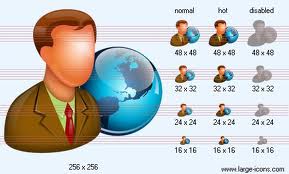Globalization is the trend of the era. Every country is reaching out for international contacts and opportunities. There is an evident desire on part of the individuals to have a profound international experience. Global workforces are developing at a rapid pace.
Global management has its own set of challenges. There is a lot to learn and practice to be successful globally. I always wondered where I should start to develop the essentials for being an international manager. A question kept ticking in my mind, “How do I develop a Global Mindset?”
 When we started with the course on Global Management, we listed the 3 essential skills of a Global Manager. That exercise took me back to the question I’ve been trying to answer for some years now.
When we started with the course on Global Management, we listed the 3 essential skills of a Global Manager. That exercise took me back to the question I’ve been trying to answer for some years now. Having a Global Mindset is one of key base thoughts for being a Global Manager. It initiates a process of transformation from being an ordinary manager to being a Global Leader. It means that that you develop and interpret criteria for every decision; personal or professional; that you make. The thought process shouldn’t be dependent or influenced by any single country or culture. One should consider the situation and the environment around in that particular country and culture to implement any specific decisions.
As learned through the course of Global management, developing a Global mindset requires some ground work to be done. There are certain concepts which we should understand and apply in the different cultural settings.
Firstly we have to evaluate the cultural background of our own self, how much do we know about ourselves. The values we hold, the skills we practice, the thoughts we think, the ideas we generate etc. Then it’s time to look for similar traits in others, to analyze how do the others differ or match with your own culture and thinking.
It would be advisable to follow the same sequence when analyzing your organizations, with that of the others. Try to understand what the dominant orientation of the organization is. Whether the organization is based out of hierarchy, or adhocracy; whether it has a very friendly clan culture or is it only focused on the market shares. The perception of the organization may change from that of an employee to that of a senior manager however the overall orientation of the organization may be similar throughout the organization.
 It is important to note again that, whether at individual level or the organization level the visibility of the tasks remains the same. What you see as the norms and behaviors of the individuals in a particular country or culture is only the tip of the ice berg in the wide ocean. Personal values and attitudes are less visible parts of the ice berg which can be seen but need a close examination and analysis. The Cultural values and Assumptions are the hidden and submerged part which needs to be questioned everyday to know what they really mean.
It is important to note again that, whether at individual level or the organization level the visibility of the tasks remains the same. What you see as the norms and behaviors of the individuals in a particular country or culture is only the tip of the ice berg in the wide ocean. Personal values and attitudes are less visible parts of the ice berg which can be seen but need a close examination and analysis. The Cultural values and Assumptions are the hidden and submerged part which needs to be questioned everyday to know what they really mean. The Bafa Bafa simulation was a perfect example to learn how an individual would react to a new culture or trend. What would be his/her initial tactics to adjust to the new culture and how quickly the individual can accustom to the new culture? It would be a great if we could device a similar exercise in real life scenarios to learn more about different cultures and traits.
 The MBI analysis gave us a methodology to formulate a high performance output. Although not to be followed in a sequential manner the MAP, BRIDGE, INTEGRATE method gives us an analysis tool to evaluate the formulation of the particular task. The Mapping indicates understanding the differences, the cultural perspective and its various dimensions. The Bridging is a step to communicate across borders trying to overcome the differences with motivation and confidence. Bridging also helps decenter or focus on particular standpoints where it doesn’t appear to be blame. Integrating is an art managing the differences and it involves a lot of smaller activities like promoting participation, resolving conflicts and developing on new ideas. The MBI methodology teaches you to value the differences and the differences thus create value, thus achieving high performance output.
The MBI analysis gave us a methodology to formulate a high performance output. Although not to be followed in a sequential manner the MAP, BRIDGE, INTEGRATE method gives us an analysis tool to evaluate the formulation of the particular task. The Mapping indicates understanding the differences, the cultural perspective and its various dimensions. The Bridging is a step to communicate across borders trying to overcome the differences with motivation and confidence. Bridging also helps decenter or focus on particular standpoints where it doesn’t appear to be blame. Integrating is an art managing the differences and it involves a lot of smaller activities like promoting participation, resolving conflicts and developing on new ideas. The MBI methodology teaches you to value the differences and the differences thus create value, thus achieving high performance output.Though learning to survive then excel in the team and organization is an important objective in developing the global mindset it is primarily more important to realize what are the personal changes required to achieve that objective.
One has to learn how to mould oneself to get into the framework of developing a global mindset. It involves grooming yourself with skills and techniques to face the situation. These range from developing Leadership skills, to mastering the art of persuasion. It also tests how you influence the people around you and what are your abilities for conflict resolution.
It was essential learning to find out what my strengths are and how do I work to improve upon them. The Strengths based Leadership session was indeed a new learning and thought provoking. First there were some qualities which were never recognized as strengths. Second, I didn’t notice that I actually used these qualities so frequently. Third, the realization of strength gave a new approach to developing the Leadership skills.
The usual approach till now was to work on my weakness such that I can be efficient enough if I ever had to encounter them. However with the realization, that developing the weaknesses would only enable me to withstand the situation gives me a feeling of insecurity. On the other hand working on the strengths gives me an opportunity to excel and be a domineering force in that particular field.
It’s not a rocket science realization that working on strength does make you extraordinary personnel. But it really works for instance, I have an anomaly that prevents me from being a fluent speaker, something called as a cleft. The consequence is that I have to make an effort to speak coherently. This is a weakness I have been trying to overcome since years. The more I try to overcome it, the more difficult it gets to conquer..Despite being a confident person I end up missing a lot of verbal communications. Over the years, I have found an alternative solution to my inability to speak, viz. to write. I have been more efficient to converse in the written format than the verbal communications. I can now surely consider it to be one of my strengths. Thus moving ahead I’m going to work on my writing skills and develop it to such an extent that it makes communications far easier for me.
The Strengths based Leadership assessment identified some more of my strengths viz. Belief, Woo, Maximizer ,Ideation, Positivity
I have natural ability to charm others. Now I have to make sure that I do that with integrity such that almost all my contacts turn into my followers. This would be an excellent opportunity to build the trust in others and maintain a long lasting relationship.The working point on this strength should be to find out ways to develop these relationships and take them to the next level.
There is indeed something to cherish when you find “Ideation” as one of your strengths. It is easier to come out with ideas to do things in a different way. Lateral or alternative ideas are always appreciated and paid a heed. I can always question “why” I do a thing in a particular way and then explain to others. This way it does let people see that I’m working on improving. More importantly it is to make things more simple and comprehensible to everyone around. Ideas sometimes can be confusing and annoying but it would be a challenge to articulate them such everyone else can see what I want to express.
I also believe that attitude of service is more important than any other religious or spiritual belief. Surely talent in action speaks a lot louder than words; it creates a lot of integrity in you.
There are several more lessons learnt from the Global Management course and takeaways are way too many to summarize in a single document with limited number of pages. If you really have to develop a global mindset then I have apply all or most of the concepts learned in the course.
No comments:
Post a Comment